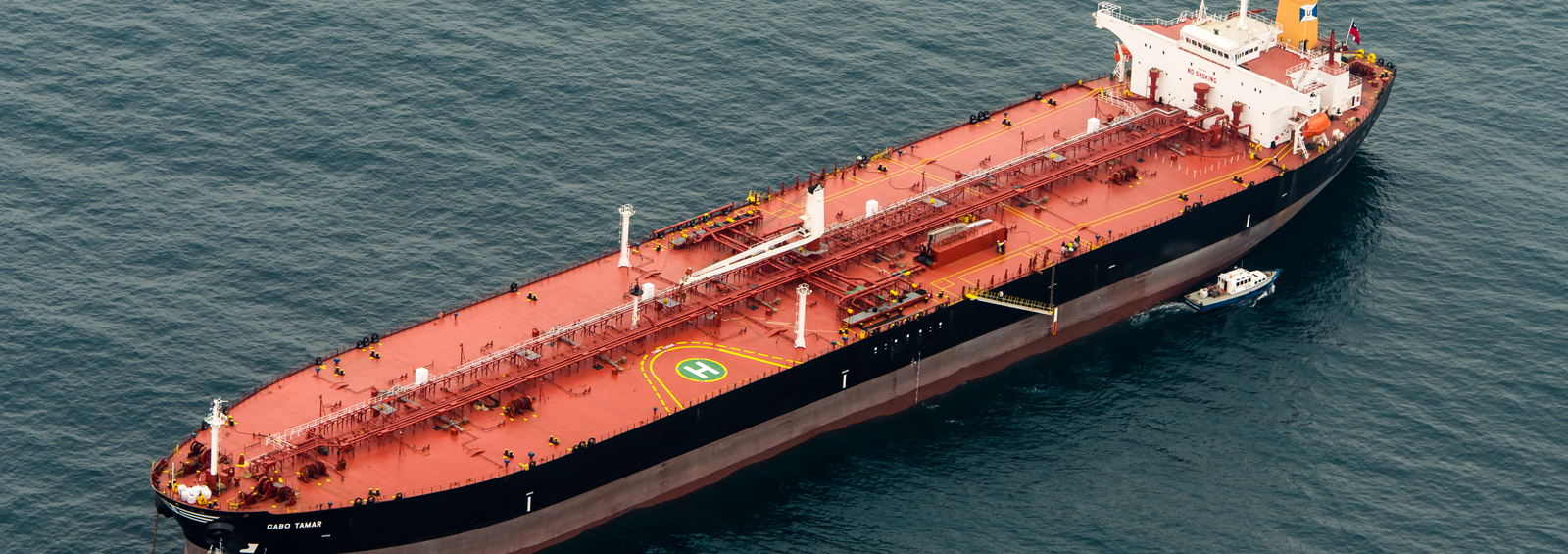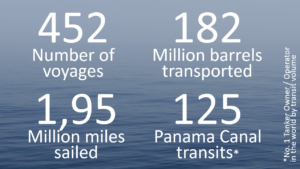
In September of this year, Cape Tankers reached the 25-year milestone. A big event was being planned to celebrate this incredible accomplishment. Unfortunately, for reasons we are all aware of, these plans had to be cancelled and we have instead embarked on a significantly more important campaign, namely helping our families and friends dealing with the devastating effects of the COVID-19 pandemic. In our service industry, we strive to perform effectively in all areas, responding to these unforeseen obstacles as efficiently as possible in order to be present and accessible to everyone. Today, we feel there is light at the end of the tunnel, and that together we will successfully defeat the challenges brought on by this pandemic.
Going back to 1995, we want to name the pioneers of the oil and gas transportation on the West Coast of South America. In Chile we have to mention Sonap and Ultragas, and in Peru it is Petrolera Transoceanica and ENS. At that time, their main role was to fulfill the needs of the oil companies Enap and Petroperu, both state-owned companies.
In the 1970s, Sonap started exploring the international trades and with the adventurous spirit that characterized them, this shipping group orders the first Panamax Tanker newbuilding that sailed around the world and in the Chilean coast for more than 25 years. We mention Ivan Soulodre as probably the first Chilean to discover and understand the Worldscale system.
Worldscale: Worldscale is a unified system of establishing payment of freight rate for a given oil tanker‘s cargo.
In Peru, ENS started their learning process of the international trades a little later, but promptly positioning themselves as the front runners with six owned Panamax Tankers.
In the early 1990s, both companies knew that trading loaded that Panamax optimization by creating synergies together was something to pursue. Previous cooperating agreements never worked between Sonap and ENS who by the end of 1994 terminated its shipping activities.
The following events welcomed Cape Tankers to the group of Panamax Tanker operators.
In June 1995, Mr. Sven von Appen from Ultranav bought Sonap from the Claro Group and coincidently Mr. Rodolfo Stiglich, an independent operator, lands in Santiago with the one goal to explore together with Mr. Enrique Ide and Mr. Jose Thomsen the long time desired possibility of joining forces. With just one day of owning Sonap, Mr. Sven Von Appen listens carefully what these three enthusiasts described as the “Trade to Develop” and as a result an agreement to this new adventure was signed, with no name yet. Mr. Sven Von Appen and Mr. Rodolfo Stiglich shake hands to start operating on the spot market with the Cabo de Hornos, a Sonap owned vessel. Mr. Sven Von Appen named this joint venture Cape Tankers. Today, Cape Tankers is the leader in number of vessels and volume in the Panamax trades worldwide.
25 years later and going through a growing process and consolidation, Cape Tankers is identified by all its clients as a reliable transportation provider and can proudly show the following benchmarks figures:
2019 Figures

Cape Tankers today:
With the hard work of our 25 qualified professionals, we currently operate a modern fleet of 40 tankers on the Panamax and Aframax segments through the Panamax International Pool together with Flopec and International Seaways and the Andes Aframax operation. All commercial activities are handled from our Miami office who is in close contact with brokers in London, Geneva, Singapore, Houston and New York. Meanwhile, our Operations Department in Santiago communicates 24/7 with our fleet, agents and suppliers to perform safely and timely the worldwide trade the fleet is being deployed.
Cape Tankers’ list of clients include oil majors and state-owned companies like Chevron, Exxon, Shell, P66, BP, Total Repsol, Unipec Petrochina, PTT, Enap, Petrobras, YPF, Ecopetrol, Petroperu. Also, the biggest downstream and trader companies like Valero, Marathon, Trafigura, Glencore, Vitol, Mercuria, Peninsula, ClearLake.
We work very hard to maintain all the vessels technically fitted, environmentally updated and with the most approvals necessary to trade on a very demanding tanker market. The list of vessels include owners like Unisea NJG Tsakos, Dynacom Nisshin which together with our own Aframaxes and Panamaxes comprise a modern mix of efficient, homogeneous vessels that allow us to satisfy our valued customers’ needs and maintain our pledge of being a partner you can trust.
We are extremely happy and proud of the statistics, figures and results, but nothing would have been achieved without all of the team members who are our biggest asset and we would like to take the opportunity to thank each of the Cape Tankers team members and invite you to celebrate this 25 years defeating, as a team, this Pandemic Virus.